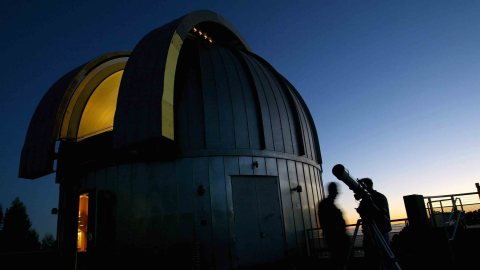Astronomy: The Gateway Drug of Science

Doing astronomy may be the closest activity we have to science-for-science’s-sake — gazing across endless distances to view objects that aren’t in the location we currently perceive them to be in. While the common dream of space travel, and the colonization of the solar system, has been a dream for millennia, our ability to make real the promises of space are still several decades off — at least.
If any field appears to be useful only for getting kids interested in science, astronomy might be it. One might then ask: What is the point of getting kids interested in studying astrophysics unless they are going to be astrophysicists? After all, we have other problems to worry about.
Dr. Alex Filippenko, researcher at the University of California, Berkeley and the most cited astronomer in the decade between 1996 and 2006, mounts a convincing defense of pure science. Since being awarded the prestigious Hertz Foundation Fellowship during his graduate studies at the California Institute of Technology, Filippenko has worked on the team that discovered the universe’s increasing rate of expansion. Today, he works regularly on the life cycles of stars, especially their spectacular deaths.
He offers us an explanation of why we should support the pure sciences, even if students don’t make careers for themselves in such fields:
“Now most kids won’t go on into astrophysics, but what they’ll do is they’ll study science and technology and they’ll go into fields that are more immediately useful to society, such as applied physics and engineering and computer science and medical physics, but the bug that bites them is often astronomy. And finally you never know what practical spinoffs there might be and let me give you a few examples.
A century ago when quantum physicists such as Einstein and Bohr and Heisenberg and Schrodinger were developing quantum physics they had not the slightest practical application in mind. They didn’t want to make a better toaster or a better bicycle or whatever. They wanted to understand the nature of light and why atoms exist, why atoms are stable, and other such questions…that seem incredibly far removed from our everyday lives.
Well, fast forward a century. You could not imagine today’s high-tech world without an understanding of the microphysics, the quantum world. Look at the silicon revolution for example, look at lasers, look at nearly everything. It all stems from quantum physics. Who would’ve thought that a century ago?”
Indeed, ideas that changed the world would have been seen as impossible a little over a century ago. Even minds as great as Lord Kelvin’scan have a tendency to view the world in fixed terms, where ideas such as “flying machines” and “X-rays” seem like a waste of time. It was the slow application of pure science, such as the realization that quantum mechanics allowed for lasers to exist, that led to the major technological progress we see today.
The study of science, without planned application, can lead to fascinating things in its own right. What physics major has not beheld the Schrodinger equation with a sense of awe at its subtle genius? Who has not read of the vastness of the cosmos and the strange and wonderful items in it and not felt an existential tinge? There is something to the study of pure, non-applicable science which is a reward in itself. The process of discovery that Tesla spoke of which is so great for the scientist that he forgets to eat. Of course, even these moments of pure science can lead to the greatest of applications. As Dr. Filippenko says:
“Who would’ve thought that a century ago when Einstein was developing the general theory of relativity that it would have this incredible practical application (of GPS)? Sure we might never get close to a black hole, which is an extreme prediction of general relativity, but it doesn’t matter. The theory was developed, it’s beautiful, it excites kids and it even has practical applications. So with much of astronomy we don’t know what the spinoffs will be, but we do know that as humans we can accomplish these goals and we can also excite kids into pursuing areas of science and technology….”
Looking for an application when deciding to do science is a sure way to miss the big picture. Some of the most important, practical, and useful applications of science stem from the most impractical of research, such as relativity. But even if an idea never gives us one iota of practical application, it can go on to inspire young minds with its grandeur. And, in the end, isn’t that one of the most important applications science can have?
—





